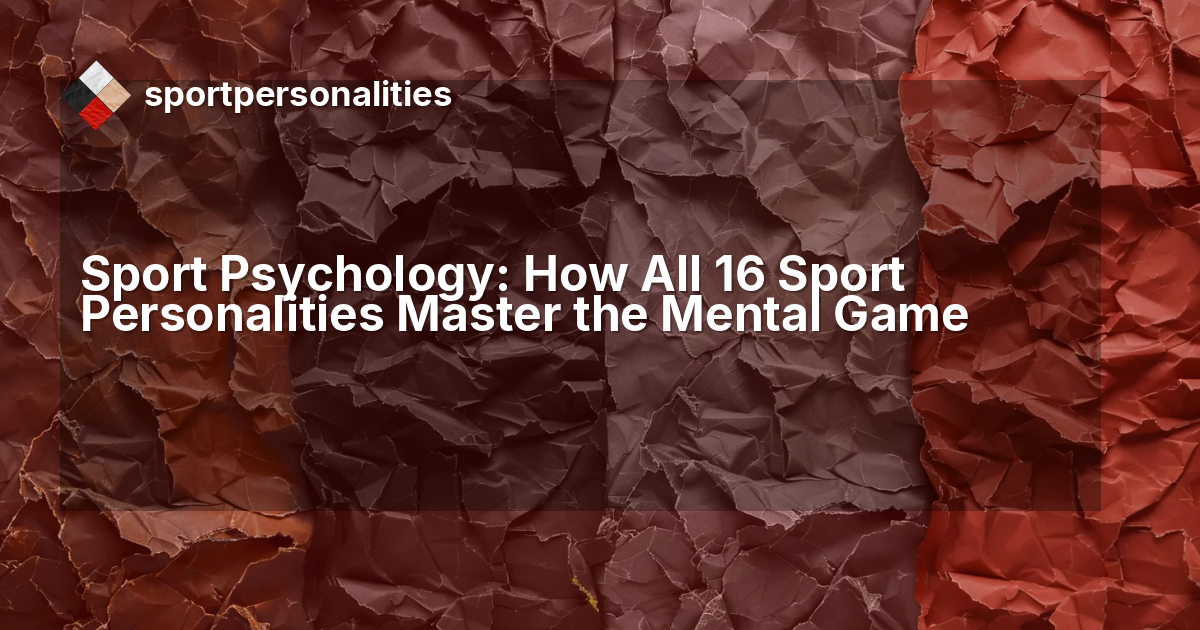The Complete Guide to Sport Psychology: Training for All 16 SportPersonalities Type to Improve Their Mental Skills
What is sport psychology? Sport psychology is the scientific examination of the impact of psychological factors on athletic performance and the influence of sports participation on psychological well-being. It helps athletes reach their full competitive potential by teaching them how to understand their own mental profile and using personality-based methods, mental skills training, and performance optimization strategies.
Every athlete has been there: standing at the free-throw line with only a few seconds left in the game, feeling the weight of the season on their shoulders. Some people do well in that moment, while others freeze. The mental framework that decides whether pressure makes performance better or worse is more important than talent and preparation. In the field of sport psychology, these instances illustrate the interplay between psychological preparation and personality.
Find Your Sport Personality
Take the free SportDNA Assessment to uncover which of the 16 athletic profiles best matches your motivation, mindset, and competitive style.
Start NowWhat is Sport Psychology: The Complete Definition
Sport psychology sits at the intersection of behavior, cognition, and performance. It looks at how mental processes affect the results of competition and how sports affect mental health. Imagery, attentional control, pre-performance routines, and recovery strategies are all examples of evidence-based methods. Clinical sport psychology deals with mental health problems that happen in sports. Developmental sport psychology examines confidence and character development throughout the lifespan.
Mental skills are teachable. Like strength or speed, focus and resilience improve through deliberate practice. The most effective training aligns with an athlete’s personality structure rather than applying generic protocols.
Foundational Focus
Performance psychology: execution under pressure. Clinical: mental health in sport. Developmental: growth across the career arc.
Trainable Capacities
These include attention control, self-talk, imagery, arousal regulation, resilience, confidence, decision speed, and recovery routines.
Personalization Lever
The Four Pillars profile determines which techniques feel natural and which require adaptation.
The Origins and Scope of Sport Psychology
Modern sport psychology traces back to early twentieth-century work by Coleman Griffith, who examined how focus, confidence, and rehearsal affect performance. Over time, research expanded into motivation science, attention control, and goal orientation, integrating insights from neuroscience and coaching. Professional bodies such as the Association for Applied Sport Psychology (AASP), the International Society of Sport Psychology (ISSP), and the European Federation of Sport Psychology (FEPSAC) set education and practice standards, making sport psychology a core part of athlete development.
Historical Focus
Early labs studied reaction time, concentration, and confidence under pressure.
Modern Integration
Current practice blends psychology, physiology, and data-informed coaching.
Professionalization
Global organizations (AASP, ISSP, FEPSAC) formalized standards and ethics.
Core Goals of Sport Psychology
The discipline seeks to enhance performance and protect well-being. Practitioners help athletes regulate emotion, sustain motivation, and execute consistently under pressure. Beyond results, sport psychology supports identity balance, resilience, and healthy career transitions.
Enhance Performance
Improve focus, confidence, and decision quality in training and competition.
Strengthen Motivation
Align goals with intrinsic or extrinsic drivers to maintain effort over time.
Support Well-Being
Manage anxiety and burnout, and develop recovery and identity skills.
Evidence-Based Methods and Techniques
Effective programs select methods that match the athlete’s psychological profile and training context. The same tool can help one profile and hinder another, which is why personality alignment matters.
Visualization
Mental rehearsal to prime execution and confidence for specific scenarios.
Goal Setting
Clear process and outcome targets to focus attention and track progress.
Self-Talk
Replace unhelpful thoughts with task-relevant cues and constructive language.
Relaxation & Mindfulness
Breathing, body scans, and awareness drills to regulate arousal and recover.
Attention Control
Focus grids, cueing, and reset routines to manage distractions under fatigue.
Coaches and Practitioners in Sport Psychology
Coaches, sport psychologists, and performance staff share responsibility for the mental side of performance. Certified specialists design individualized programs; coaches operationalize them in practice; organizations embed psychological literacy in culture and communication.
Coaches
Use timing of feedback, cue words, and session design to build resilience and focus.
Sport Psychologists
Create personality-aligned mental skills plans and address barriers to execution.
Teams & Organizations
Integrate mindset education, leadership behaviors, and recovery norms across the season.
The 16 Athletic Personality Types: Complete Overview
This framework recognizes that athletes differ in cognitive style, motivation, competitive reference, and social preferences. Training should match that structure.
| Sport Profile | Code | Core Mental Approach | Key Psychological Strength |
|---|---|---|---|
 The Anchor (ISTC) The Anchor (ISTC) |
ISTC | Strategic preparation through collaborative team focus | Stability under pressure through planning |
 The Captain (EOTC) The Captain (EOTC) |
EOTC | Tactical leadership that shapes team mental state | Turning individual confidence into collective belief |
 The Daredevil (ESRA) The Daredevil (ESRA) |
ESRA | Instinctive decisions that convert uncertainty into chances | Mental adaptability in high stakes |
 The Duelist (IOTA) The Duelist (IOTA) |
IOTA | Opponents as tactical puzzles | Confidence from exhaustive preparation |
 The Flow-Seeker (ISRA) The Flow-Seeker (ISRA) |
ISRA | Mind–body unity through movement | Access to deep flow states |
 The Gladiator (EORA) The Gladiator (EORA) |
EORA | Warrior mindset that channels confrontation | Converting pressure into fuel |
 The Harmonizer (ISRC) The Harmonizer (ISRC) |
ISRC | Balance of mastery with team harmony | Emotional intelligence for group stability |
 The Leader (IOTC) The Leader (IOTC) |
IOTC | Strategic team psychology with inspiration | Translating passion into team confidence |
 The Maverick (IORA) The Maverick (IORA) |
IORA | Independent framework trusting intuitive instincts | Self-reliant resilience in duels |
 The Motivator (ESTC) The Motivator (ESTC) |
ESTC | External validation used to drive internal growth | Inspiring collaborative excellence |
 The Playmaker (IORC) The Playmaker (IORC) |
IORC | Real-time orchestration of team decisions | Split-second processing under chaos |
 The Purist (ISTA) The Purist (ISTA) |
ISTA | Intrinsic pursuit of mastery | Sustained focus on personal standards |
 The Record-Breaker (ESTA) The Record-Breaker (ESTA) |
ESTA | Systematic linkage of process to outcomes | Analytical tracking of mental variables |
 The Rival (EOTA) The Rival (EOTA) |
EOTA | Opponent-focused strategic rehearsal | Mental warfare through preparation |
 The Sparkplug (ESRC) The Sparkplug (ESRC) |
ESRC | Energy that lifts individual and team states | Reading and shifting momentum |
 The Superstar (EORC) The Superstar (EORC) |
EORC | Turning pressure into standout execution | Charisma in big moments |
The sport profiles organize into four groups:
- The Crew: collaborative mental health and team harmony.
- The Maestros coordinated team psychology against specific opponents.
- The Soloists: autonomous mastery guided by internal standards.
- The Combatants: direct head-to-head mental warfare.
The Four Core Pillars That Shape Your Sport Psychology Approach
Cognitive Style: The Mental Game Plan
Reactive athletes rely on present-moment cues and flexible responses. Training focuses on awareness, momentum reading, and micro-adjustments. Tactical athletes prefer detailed game plans, opponent study, and if–then scripts. Training includes scenario visualization, journals, and structured routines. Add flexibility training for unexpected shifts.
Competitive Style: The Target of Competition
Self-referenced athletes define success by personal standards and process goals. Techniques that emphasize rivalry can create friction. Other-referenced athletes gain energy from hierarchy and opponent comparison. Techniques should include competitive intelligence and rivalry frameworks while managing emotional swings.
Drive: Your Source of Motivation
Intrinsic athletes respond to values, meaning, and mastery. External rewards often dilute engagement. Extrinsic athletes respond to measurable milestones, public stakes, and recognition. Build sustainable structures for periods with less external feedback.
Social Style: The Performance Environment
Autonomous athletes need self-directed frameworks and private processing. Collaborative athletes need connection, shared purpose, and interpersonal routines. Build boundaries and supports that fit each style.
Map Your Four Pillars
Identify your Reactivity vs. Tactics, Self vs. Other reference, Intrinsic vs. Extrinsic drive, and Autonomous vs. Collaborative style. This becomes your mental training blueprint.
Find Your Sport Personality
Take the free SportDNA Assessment to uncover which of the 16 athletic profiles best matches your motivation, mindset, and competitive style.
Start NowChoose Core Methods
Select two techniques that feel natural and one that stretches you. Natural methods build consistency. Stretch methods expand range.
Test and Calibrate
Run 2–3 week microcycles. Track perceived control, focus quality, decision speed, and post-session recovery. Keep what raises performance with low friction.
Explore deeper: Cognitive Pillar, Competitive Style, Drive, and Social Style.
How Each Personality Type Approaches Sport Psychology
The four families below offer a quick path to aligned methods.
The Crew: Collaborative Mental Development
The Anchor, The Harmonizer, The Motivator, and The Sparkplug develop through connection while protecting individual resilience.
Establish Dual Routines
Create a private pre-performance routine plus a brief team sync. This keeps stability when team dynamics fluctuate.
Refine Feedback Loops
Use short debriefs with clear roles. Separate emotional ventilation from tactical decisions.
Protect Boundaries
Define what help looks like and when to self-regulate. Connection supports performance; it does not replace it.
The Maestros: Team Performance Psychology
The Captain, The Leader, The Playmaker, and The Superstar link individual preparation to the team’s tactical and emotional state.
Integrate Opponent Psychology
Prepare mental cues for likely shifts in rival intensity. Rehearse how you will influence teammates quickly.
Script Communication
One call for arousal up, one for calm down, and one for reset. Keep language short and repeatable under stress.
Separate Identity from Outcome
Use personal KPIs for mindset quality so a team loss does not erase individual psychological progress.
The Soloists: Autonomous Mental Mastery
The Daredevil, The Flow-Seeker, The Purist, and The Record-Breaker thrive with independence and precise self-coaching.
Build a Self-Coaching System
Daily journal, pre-session intent, post-session rating for focus, emotions, decisions, and recovery.
Expand Your Range
Add one unfamiliar method each cycle: a brief team drill, a public challenge, or a collaborative review.
Define External Triggers
Set criteria for when to seek input. Strategic collaboration differs from dependency.
The Combatants: Head-to-Head Mental Warfare
The Duelist, The Gladiator, The Maverick, and The Rival gain energy from confrontation.
Analyze Opponent Psychology
Track reactions under pressure, reset habits, and tell. Consider incorporating counter-cues into your routine.
Regulate Intensity
Use breath counts, focal points, and between-play resets to prevent over-arousal.
Sustain Drive Without Rivals
During soft periods, set sparring benchmarks, simulated pressure reps, and public micro-goals.
Finding Your Athletic Personality Type
Reflect on four questions that map to the Pillars. Do you trust instinct or plans under stress? Do you measure progress against yourself or rivals? What sustains motivation when progress stalls? Do you perform best with independence or with shared energy? Your answers reveal your four-letter code and sport profile.
Examples: EORA is The Gladiator: reactive, other-referenced, extrinsic, and autonomous. ISTC is The Anchor: tactical, self-referenced, intrinsic, and collaborative. Take the complete assessment for a precise profile and targeted sport psychology plan.
Audit Motivational Patterns
Track training intensity across environments. Identify settings, social contexts, and external factors that correlate with peak engagement.
Design Activation Architecture
Schedule spotlight moments, accountability structures, and opponent-awareness practices before motivation naturally declines.
Establish Collaborative Touchpoints
Create regular team interactions, mentorship, or training partnerships that engage collaborative instincts during individual phases.
Practical Applications: Sport Psychology by Sport Profile Group
Mental Skills Training for The Crew
Build personal routines that stand even when team dynamics fluctuate. Debrief quickly, separate emotion from tactics, and use peer support without dependency.
Mental Skills Training for The Maestros
Blend opponent psychology with technical plans. Prescript concise communication and rehearse team timing in visualization. Track mindset KPIs independent of outcomes.
Mental Skills Training for The Soloists
Create a self-coaching loop with journals and metrics. Introduce controlled collaboration to expand range. Define triggers for external input.
Mental Skills Training for The Combatants
Scout psychological patterns, regulate arousal, and maintain drive when no clear rival is present through simulations and public micro-goals.
Find Your Sport Personality
Take the free SportDNA Assessment to uncover which of the 16 athletic profiles best matches your motivation, mindset, and competitive style.
Start NowFrequently Asked Questions about All 16 Sport Profiles
What is sport psychology?
Sport psychology is the scientific examination of the impact of psychological factors on athletic performance and the influence of sports participation on psychological well-being. It helps athletes reach their full competitive potential through mental skills training.
How does personality affect athletic performance?
Athletic personality determines how athletes respond to pressure and competition. Techniques must align with your cognitive style, motivational drive, competitive disposition, and social inclinations for optimal performance results.
What are the 16 athletic personality sport profiles?
The 16 SportPersonalities sport profiles represent different mental profiles that athletes possess, each requiring personalized mental skills training approaches based on their unique cognitive and competitive characteristics.
Why is personalized mental training important in sports?
Personalized mental training is crucial because techniques must feel natural rather than forced. Methods should align with an athlete's individual SportDNA profile, cognitive style, and competitive disposition for maximum effectiveness.
Conclusion: Your Personality Type is Your Performance Advantage
Apparent contradictions in generic advice reflect different optimizations for different profiles. The Purist’s deep focus will not fit the Daredevil’s instinctive brilliance. The Rival’s competitive intensity will not serve the Flow-Seeker’s state. Neither is superior. Both are effective when aligned with the athlete.
Your goal is refinement, not reinvention. Build on your cognitive style, competitive orientation, motivation, and social preferences. Leverage strengths, then add targeted methods to expand range. Start by identifying your sport profile, then implement the protocols that match how your mind works.
References
- Psychological Skills Training for Athletes in Sports (Pmc.ncbi.nlm.nih.gov)
- Sport psychology and performance meta-analyses (Pmc.ncbi.nlm.nih.gov)
- It's All About the Mental Game (Journalofsportbehavior.org)
- (PDF) Sport Psychology and Masters Athletes (Researchgate.net)
- Athletes mental health, performance, and development (Issponline.org)
This content is for educational purposes, drawing on sport psychology research and professional experience. I hold an M.A. in Social Psychology, an ISSA Elite Trainer and Nutrition certification, and completed professional training in Sport Psychology for Athlete Development through the Barcelona Innovation Hub. I am not a licensed clinical psychologist or medical doctor. Individual results may vary. For clinical or medical concerns, please consult a licensed healthcare professional.

















